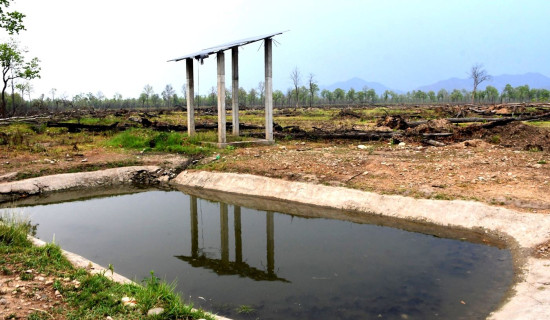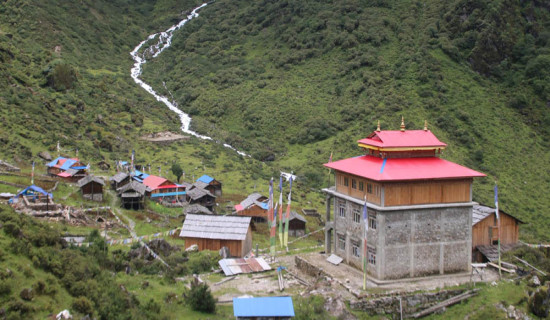- Thursday, 31 July 2025
Three lakes of Pokhara in neglected state
By Phadindra Adhikari,Lekhnath, June 24: Three lakes in Pokhara Metropolitan City-26, once used for commercial fish farming through cooperatives, are now in a neglected state.
For some time now, the Ward Office of Pokhara-26 has prohibited fish farming in the lakes from cooperatives. Stakeholders said that stopping the cooperatives without introducing an alternative arrangement or management mechanism by the metropolis has created various problems.
In recent times, hundreds of people visit the lakes daily to catch fish, make noise and run around the paddy fields. Local Nabaraj Adhikari said that the disagreement between the cooperative and the ward office has led to disorder in the lakes, with uncontrolled entry of outsiders, noise and activities like fishing affecting daily life.
“The cooperative used to manage it before. Even if the ward wants to manage it now, let them do so properly. But the lakes should not be turned into a hub for fish theft and disorder,” Adhikari said.
The Khaste, Nyureni and Gunde lakes in the area are also tourist attractions. Locals established the Khaste Lake Fishery and Agriculture Cooperative to manage the lakes and start fish farming in January 2017. After that, efforts were made to preserve the integrated lake and commercial fish farming also flourished.
Hari Adhikari, former chair of the cooperative, said that the lake was in the neglected state until 2012, but the locals managed the previously neglected lakes and generated income through the government, but now problems have arisen.
“Now the ward office has not even provided recommendations. They stopped the fish farmers as well. Moreover, the ward office itself did not take responsibility for proper management. Our decade-long efforts and hard work have gone to waste,” Adhikari said.
Jhalak Jalari, who had taken responsibility for fish farming through the cooperative, claimed that nearly Rs. 15 million of his investment has been lost. He had signed a 10-year agreement with the cooperative to pay Rs. 80,000 monthly for fish farming in Khaste and Nyureni lakes. He had also taken responsibility for fish farming in Gunde Lake by paying Rs. 45,000 monthly to the Gunde Lake Fishery Cooperative. Jalari claimed to have invested around Rs. 6 million in Gunde Lake.
“It has been about five months, and I have not been able to work. I see hundreds of people come every day and kill the fish I had stocked. The ward neither managed the lakes properly nor allowed me to earn from my investment,” he said.
The Khaste Lake Fishery and Agriculture Cooperative has around 750 shareholders. Spanning an area of 269 hectares, the lake covers around 200 hectares of water surface. Many indigenous fish species as well as migratory birds can be found here.
Nyureni Lake spans 18 hectares, with around 10 hectares covered by water. Gunde Lake is named after the “Gunde” grass found in the area, traditionally used for mat weaving, and covers an area of 61 hectares.
Narendra Thapa, Chairperson of Pokhara Metropolitan City Ward-26, said the lakes are natural resources and should remain under government control, which is why the lakes are being managed accordingly.
“The cooperatives were exploiting the resources. That should not happen. Now the metropolis will manage and generate income from the lakes. A committee is being formed to manage them in an organised manner,” he said.















